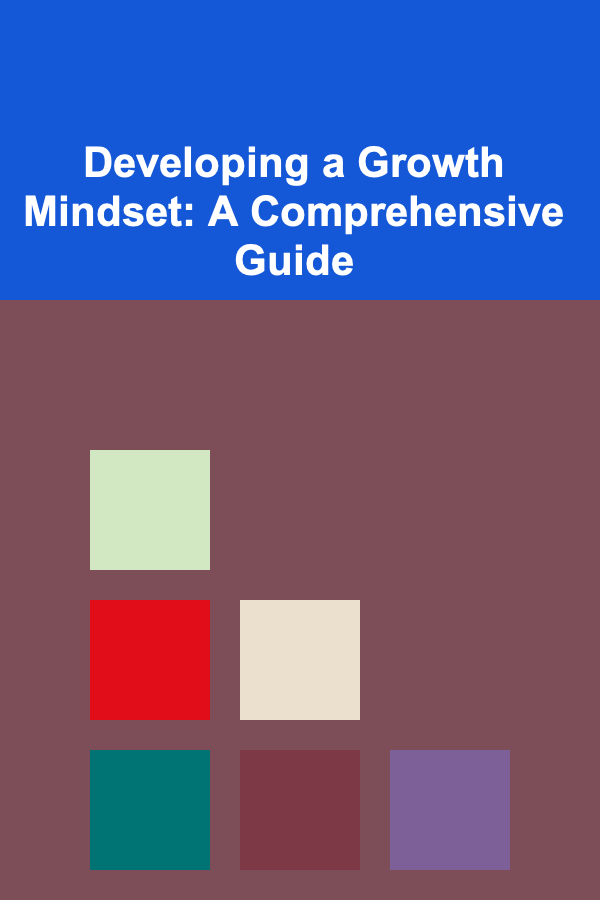
Developing a Growth Mindset: A Comprehensive Guide
ebook include PDF & Audio bundle (Micro Guide)
$12.99$6.99
Limited Time Offer! Order within the next:

In a world that constantly demands improvement and adaptation, cultivating a growth mindset is no longer a desirable trait, but a necessary skill. A growth mindset, pioneered by Carol Dweck, a renowned Stanford University psychologist, is the belief that abilities and intelligence can be developed through dedication and hard work. It's a stark contrast to a fixed mindset, which assumes these qualities are innate and unchangeable. This article provides an in-depth exploration of what a growth mindset entails, its benefits, and, most importantly, practical strategies for developing and nurturing it.
Understanding the Core Concepts
Fixed Mindset vs. Growth Mindset
The foundation of understanding how to develop a growth mindset lies in differentiating it from its counterpart, the fixed mindset. The core differences are profound and impact nearly every facet of life, from how we approach challenges to how we interpret failures.
- Fixed Mindset: Individuals with a fixed mindset believe their abilities are predetermined. They see intelligence and talent as static qualities that cannot be significantly improved. They often avoid challenges for fear of failure, interpret setbacks as proof of their limitations, and feel threatened by the success of others. They seek validation of their existing abilities rather than opportunities for growth.
- Growth Mindset: Conversely, individuals with a growth mindset believe that their abilities can be developed through dedication, hard work, and learning from mistakes. They embrace challenges as opportunities to grow, view setbacks as learning experiences, and are inspired by the success of others. They actively seek out new knowledge and skills, continuously striving to improve.
Example: Imagine two students who both receive a poor grade on a math test. The student with a fixed mindset might think, "I'm just not good at math. There's no point in trying harder." The student with a growth mindset, however, might think, "Okay, I didn't do well this time. I need to figure out where I went wrong and try a different approach next time."
The Power of "Yet"
One of the most powerful tools in fostering a growth mindset is the simple addition of the word "yet." This seemingly insignificant word reframes perceived limitations into temporary states, highlighting the potential for future growth. Instead of saying, "I can't do this," the growth mindset response becomes, "I can't do this yet." This subtle shift acknowledges the current lack of proficiency while simultaneously implying the possibility of future mastery.
Example: A musician struggling to learn a complex piece might say, "I can't play this riff yet." This acknowledges the current challenge but leaves room for future progress through practice and dedication.
Embracing Challenges and Effort
Individuals with a growth mindset actively seek out challenges because they understand that these challenges are opportunities for learning and development. They view effort not as a sign of inadequacy, but as a necessary ingredient for growth. They understand that mastery requires dedication and perseverance.
Those with a fixed mindset, however, often avoid challenges because they fear failure. They equate effort with a lack of inherent ability. They believe that if they are truly talented, things should come easily to them.
The Benefits of Cultivating a Growth Mindset
The advantages of adopting a growth mindset are far-reaching and impact various aspects of life, including academic performance, career success, relationships, and overall well-being.
- Improved Academic Performance: Students with a growth mindset tend to perform better academically because they are more likely to persevere through challenges, seek help when needed, and view setbacks as learning opportunities. They are more motivated to learn and less likely to give up when faced with difficulties.
- Enhanced Career Success: In the workplace, a growth mindset fosters innovation, adaptability, and resilience. Employees with a growth mindset are more likely to embrace new challenges, learn new skills, and adapt to changing circumstances. They are also more likely to be open to feedback and constructive criticism, which is essential for professional growth.
- Stronger Relationships: A growth mindset can also improve interpersonal relationships. Individuals with a growth mindset are more likely to view relationships as opportunities for growth and learning. They are more likely to be forgiving and understanding, and less likely to take things personally.
- Increased Resilience: Individuals with a growth mindset are more resilient in the face of adversity. They view setbacks as temporary and surmountable, rather than as permanent limitations. They are more likely to bounce back from failures and continue pursuing their goals.
- Greater Self-Esteem: A growth mindset can lead to increased self-esteem. When individuals believe that their abilities can be developed, they are less likely to define themselves by their current limitations. They are more likely to focus on their potential for growth and achievement.
Practical Strategies for Developing a Growth Mindset
Developing a growth mindset is an ongoing process that requires conscious effort and self-awareness. It's not about simply believing in the power of growth; it's about actively cultivating the habits and behaviors that support it. Here are some practical strategies to help you cultivate a growth mindset:
1. Recognize and Challenge Your Fixed Mindset Thoughts
The first step in developing a growth mindset is to become aware of your fixed mindset thoughts and challenge them. Pay attention to your inner dialogue and identify instances where you are making assumptions about your abilities or limitations. Ask yourself: Is this thought based on evidence or simply on fear? Is there another way to interpret this situation?
Fixed Mindset Thought: "I'm not good at public speaking. I always get nervous and stumble over my words."
Growth Mindset Response: "Public speaking is a skill that can be learned and improved with practice. I may be nervous now, but I can work on my skills and become more confident over time."
When you catch yourself thinking in a fixed mindset way, challenge those thoughts with a growth mindset alternative. This process of identifying and reframing your thoughts is crucial for shifting your mindset.
2. Embrace Challenges and Step Outside Your Comfort Zone
Actively seek out challenges and push yourself outside of your comfort zone. This doesn't mean taking on impossible tasks, but rather choosing activities that stretch your abilities and require you to learn new skills. Volunteering for a project that seems daunting, taking a class in a subject you know nothing about, or even simply trying a new recipe can all contribute to growth.
Remember that discomfort is a natural part of the learning process. Embrace the feeling of being challenged, and view it as an opportunity to grow and expand your capabilities.
3. View Effort as a Path to Mastery
Reframe your perception of effort. Instead of viewing effort as a sign of inadequacy, see it as a necessary ingredient for mastery. Embrace the idea that hard work and dedication are essential for developing your abilities. Understand that even the most talented individuals had to put in countless hours of practice to achieve their level of expertise.
Focus on the process of learning and improvement, rather than solely on the outcome. Celebrate small victories and acknowledge your progress along the way.
4. Learn from Feedback and Criticism
Be open to feedback and criticism, and view it as an opportunity to learn and improve. Don't take criticism personally, but rather see it as valuable information that can help you identify areas where you can grow. Actively solicit feedback from trusted sources, and be willing to make changes based on what you hear.
Remember that even negative feedback can be constructive if you approach it with a growth mindset. Focus on what you can learn from the experience and how you can use it to improve your performance in the future.
5. Celebrate Learning and Progress, Not Just Achievements
Shift your focus from solely celebrating achievements to also celebrating learning and progress. Acknowledge the effort you put in, the challenges you overcame, and the skills you developed along the way. This will help you appreciate the journey of growth, rather than just focusing on the destination.
Keep a journal to track your progress, noting your accomplishments, your challenges, and the lessons you learned. This will help you stay motivated and focused on your growth goals.
6. Model a Growth Mindset for Others
One of the best ways to reinforce your own growth mindset is to model it for others. Encourage those around you to embrace challenges, learn from their mistakes, and view effort as a path to mastery. Offer constructive feedback and support their growth efforts.
By modeling a growth mindset, you can create a culture of learning and growth in your family, workplace, and community.
7. Practice Self-Compassion
Be kind to yourself, especially when you make mistakes or experience setbacks. Remember that everyone makes mistakes, and that these mistakes are opportunities to learn and grow. Practice self-compassion by treating yourself with the same kindness and understanding that you would offer to a friend.
Avoid self-criticism and negative self-talk. Instead, focus on your strengths and your potential for growth. Remember that you are a work in progress, and that it's okay to make mistakes along the way.
8. Seek Out Mentors and Role Models
Find individuals who embody a growth mindset and learn from their experiences. These mentors and role models can provide guidance, support, and inspiration as you develop your own growth mindset. Observe how they approach challenges, handle setbacks, and continuously strive to improve.
Connect with these individuals through networking events, online communities, or personal introductions. Ask them questions about their experiences and seek their advice on how to cultivate a growth mindset.
9. Read Books and Articles on Growth Mindset
Continue to educate yourself about growth mindset by reading books, articles, and research papers on the topic. The more you learn about growth mindset, the better equipped you will be to develop and nurture it in yourself and others.
Some recommended resources include Carol Dweck's book "Mindset: The New Psychology of Success," as well as articles and research papers published by Dweck and other researchers in the field.
10. Be Patient and Persistent
Developing a growth mindset is a journey, not a destination. It takes time, effort, and persistence to shift your mindset and cultivate new habits. Be patient with yourself and don't get discouraged if you experience setbacks along the way. Remember that even small steps can lead to significant progress over time.
Continue to practice the strategies outlined in this article, and you will gradually develop a stronger and more resilient growth mindset. Believe in your potential for growth, and never stop learning and striving to improve.
Overcoming Common Obstacles
While adopting a growth mindset is beneficial, the journey is not always smooth. Several obstacles can hinder progress, and it's crucial to recognize and address them effectively.
- Perfectionism: The pursuit of perfection can be detrimental to a growth mindset. Perfectionists often fear failure and avoid challenges, hindering their ability to learn and grow. It's important to embrace imperfection and view mistakes as opportunities for learning.
- Fear of Failure: The fear of failure can be a significant obstacle to adopting a growth mindset. Individuals who fear failure may avoid challenges and stick to what they already know, limiting their potential for growth. It's important to reframe failure as a learning opportunity and embrace the process of trial and error.
- Negative Self-Talk: Negative self-talk can undermine your efforts to develop a growth mindset. It's important to challenge negative thoughts and replace them with positive and encouraging affirmations.
- Environmental Influences: The environment in which you live and work can also impact your ability to develop a growth mindset. If you are surrounded by people who have a fixed mindset, it can be difficult to maintain a growth mindset. It's important to seek out supportive environments and surround yourself with people who encourage your growth.
- Lack of Awareness: Sometimes, individuals are simply unaware of their fixed mindset beliefs. It takes conscious effort to identify and challenge these beliefs. Self-reflection and seeking feedback from others can help increase awareness.
Addressing these obstacles requires consistent effort and self-awareness. It's crucial to be patient with yourself and celebrate small victories along the way.
Conclusion
Developing a growth mindset is a transformative journey that empowers individuals to embrace challenges, learn from mistakes, and achieve their full potential. By understanding the core concepts, adopting practical strategies, and overcoming common obstacles, anyone can cultivate a growth mindset and unlock their inner capacity for growth and achievement. It's an ongoing process, requiring conscious effort and self-reflection, but the rewards are immeasurable. Embrace the journey, believe in your potential, and never stop learning and growing.

Generating Revenue with AI-Powered Automation Tools
Read More
How to Organize Your Kitchen Drawer with DIY Solutions
Read More
How to Develop a Blockchain-Based Marketplace Platform
Read More
How to Write a Song That Tells a Story Without Lyrics
Read More
How to Plan a Collaborative Twitch Stream with Another Streamer
Read More
10 Tips for Mastering Motion Graphics as a Multimedia Artist
Read MoreOther Products

Generating Revenue with AI-Powered Automation Tools
Read More
How to Organize Your Kitchen Drawer with DIY Solutions
Read More
How to Develop a Blockchain-Based Marketplace Platform
Read More
How to Write a Song That Tells a Story Without Lyrics
Read More
How to Plan a Collaborative Twitch Stream with Another Streamer
Read More